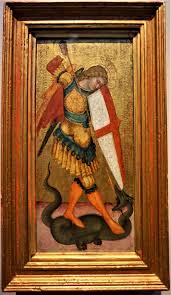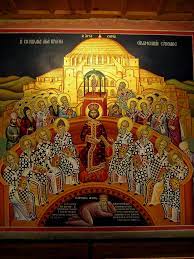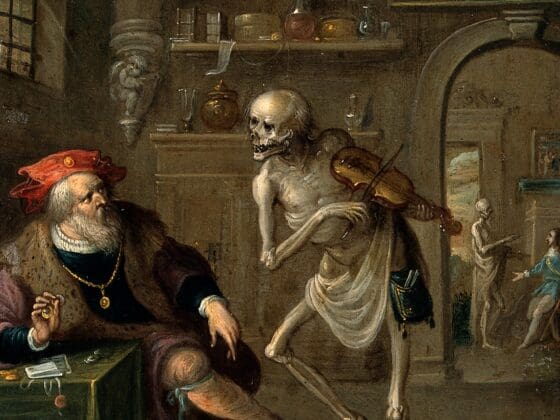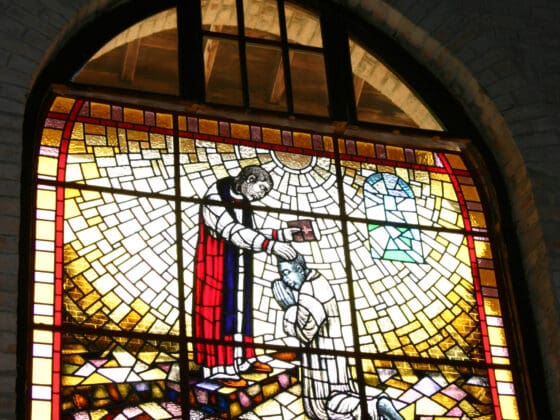I preached this sermon at Trinity School for Ministry on September 28, 1988. For a subsequent sermon, see “All Things Visible and Invisible.”
Lessons for the Day
Revelation 12
Matthew 13:24-30,36-43
You might as well know why I get assigned to preach on St. Michael and All Angels’ Day year after year after year. You see, I am relentlessly writing a book on angels [N.B. the book was completed ten Michaelmases later], and so they figure I must have something to say on this rather embarrassing subject.
Let’s face it: talk about angels is embarrassing. In a recent book on “the powers,” Walter Wink expresses the awkwardness of the subject:
What does late twentieth-century society exclude from conversation? Certainly not sex; at least in the more “sophisticated” circles accounts of sexual exploits scarcely raise an eyebrow. But if you want to bring all talk to a halt in shocked embarrassment, every eye riveted on you, try mentioning angels, or demons, or the devil. You will be quickly appraised for signs of pathological violence and then quietly shunned.
We conservative Anglicans may be a bit too backward to make sex the prime topic of our conversation, but I will bet you that we don’t say much about angels either. Why is that? Why do even those Christians who have encountered angels – and I have known a number – hesitate to relate their stories. Well, it seems to me there is one good reason for this: angels never appear center stage: they are always in the wings!
Angels are found in the margins of the Bible story. You may remember Jacob’s habit of bumping into an angelic border guard when he fled from the Holy Land and again when he returned years later. Likewise Joshua was surprised on entering the Land to run into the captain of the LORD’s host. Angels often get salvation history going, as when they visited Abraham and Sarah at Mamre; sometimes they also close the book on someone, as when the fiery chariots swept Elijah away. The presence of angels frames the life and death of our Lord, from the Christmas angels to the angels at the Empty Tomb.
Angels are marginal. For many modern Christians, this very marginality is a reason for neglecting them – either by explaining them away with secular rationalizations, or by aestheticizing them into cute little cherubs to be found only in stain glass windows, or by simply ignoring them. So even for us evangelical Christians, it is all too easy to assume that we do not need angels when we have the great doctrines of justification and salvation in Christ. (This tendency goes back quite a ways to John Calvin, for whom the glory of the sovereign God overwhelmed the majesty of his heavenly host.)
But, my brothers and sisters, we neglect the presence and ministry of the holy angels at great risk. We might be warned by no less a modern theologian than Karl Barth when he says:
If we insist that theology is exclusively and abstractly a matter of God and man…, then obviously there will be no place for, or understanding of, angels. But obviously, too, we shall not be dealing with the work and revelation of God as attested in the Bible, with Jesus Christ, and therefore with God and man in the form in which they are normative for the Christian Church and its faith and proclamation. For where it is matter of God and man in this normative form…it is always a matter of heaven and earth…. For in the relationship first between God and heaven, then between heaven and earth, and then and decisively between God and man, the angels have their specific place.
Yes, the angels are border guards, but they mark borders which we in our earth-bound and time-bound existence are all too wont to lose sight of. By recalling the angels, we also recall the essential dimensions of our salvation in Christ.
The first of these dimensions is vertical or spatial – the border between heaven and earth. In our lesson today from Revelation, chapter 12, we hear about two battles. One battle is waged by Michael and his angels in heaven against the Dragon and his cohort. It is no contest. Because of the birth of the Christ-child and His exaltation to the throne of God, the ancient deceiver is cast down to earth in an instant and can no longer accuse the believers in heaven. The second battle is prolonged: the dragon in frustration devastates the earth and persecutes the church “because he knows his time is short.”
In this respect the outcome of this angelic battle is bad news for the inhabitants of earth. If the heavens are swept clean from Satan and his demonic host, the earth finds itself doubly oppressed. The silly superstitions of idolatry will yield to a grim program of secularism, enforced by the political might and propagandistic subtlety of the Beast and his false prophet. Nor will the followers of the Lamb, the Church, be exempt from this oppression, for it is the Dragon’s prime goal to make war against her offspring. In this battle, they have no magic St. Michael’s medals to aid them. No angels will descend from heaven to intervene for them; indeed they will be persecuted unto death.
What is offered the believers is captured in Luther’s “A Mighty Fortress”: “one little word will fell him.” It is an angelic voice preaching good news: “Now the salvation and the power and the kingdom of our God and the authority of his Christ has come…” We are not spared the fellowship of misery on earth, but we are invited to join in chorus after chorus of heavenly praise for the victory which has already been accomplished in Christ: “We give thanks to thee, Lord God Almighty, who art and who wast and who art to come, that thou hast taken thy great power and begun to reign.”
In our Gospel lesson, the Parable of the Wheat and the Tares, we see a second, horizontal, temporal dimension of the presence and activity of the angels. Jesus describes the world as a field planted with wheat by its owner but corrupted by an enemy who sowed weeds alongside the good plants. It is one thing to discern that the field has been polluted but another to know how to purify it. The master’s servants are tempted to root out whole patches of the planting, but the master will not allow one good plant to be lost. He advises them to wait until the harvest arrives so that the professional gleaners can sort out the true from the false plants. Jesus interprets this final harvest in terms of his own Coming: “the Son of Man will send his angels and they will gather out of his kingdom all causes of sin and all evildoers and throw them into the furnace of fire…. Then the righteous will shine like the sun in the kingdom of their Father” (Matthew 13:41-42).
We might note that the Christian’s life in the world is framed by angelic activity. We find ourselves placed in a fallen world, where Satan has gained a dominant foothold. Not only is life infected by evil but it is confused by it. We cannot always know whom to trust nor even know in ourselves what is a cause of sin and what not. The Deceiver seems to have stacked the deck against us, and even when we pray to the Master, we are told only to wait and to trust that the course of this world will end and that the close of the age will come.
But just as Satan’s prior activity makes life a confusing burden, so the appearance of angels at the end of the age makes clear that the kingdom will come. More than that, it assures us that the coming kingdom is worth waiting and suffering for. For the angels are the servants of the original Master who planted the vineyard and of the Son of Man who has redeemed it and will restore it in perfection and glory.
Now as I sum up, let me return to an image I alluded to earlier. I said that angels do not appear center stage but in the wings. So be it. But that does not mean their presence is unimportant or dispensable. Without them man is left on a bare stage with a pointless script. Without them he finds himself acting out a horrid existential farce like No Exit or Waiting for Godot, with blank walls, petty, back-biting characters, and a theme of bored hopelessness. Without them he might agree with Macbeth: “Life’s but a walking shadow, a poor player that struts and frets his hour upon the stage and then is heard no more. It is a tale told by an idiot, full of sound and fury, signifying nothing.”
I would venture to say that life without the angelic dimension may become barren even for the Christian. God may become to us a distant landowner, an absentee playwright; Christ’s work itself may become a verbal symbol only, a private belief that does not invade our lives from above and only a distant and vague hope for the future. Without the awareness of angelic activity, the wheat may come to think itself tares.
But if the angels are in the wings, we know that even now, in the midst of our poor script of a life, there is a heavenly liturgy going in a realm of perfect light and that we can listen in. We know that the very darkness of our world is a sign of victory, that the Dragon has been cast to earth because his time is short. And despite our loneliness and doubts, we know that this heavenly kingdom is our inheritance, our homeland, that the angels of God rejoice over one sinner who repents, that they hand-deliver the soul of every poor Lazarus into the bosom of Abraham, that they swing their chariots low for every needy slave and saint, that they watch over with grief and love every aborted “little one” for whom Christ died.
If angels are in the wings, the time will come when they will heed the great command of the Son of Man and draw down the curtain on this age. The tedious tragedy and comedy of history will come to an end. Thrones of judgment will be set up and they will usher those who allied themselves with Satan into outer darkness, but the steadfast, those who remained faithful in their confession, they will invite to the Marriage Supper of the Lamb.
Brothers and sisters, this is a salvation worth waiting for, worth sacrificing everything else for. This morning we are invited not just to play-act but genuinely to come to the Lamb’s Supper and to enter into this great chorus of salvation:
“Then I heard what seemed to be the voice of a great multitude, like the sound of many waters and like the sound of mighty thunderpeals, crying,
Hallelujah! for the Lord our God the Almighty reigns.
Let us rejoice and exult and give him the glory,
for the marriage of the Lamb has come,
and his Bride has made herself ready.”Artwork: St. Michael and the Dragon (Siennese School) Wikimedia Commons





